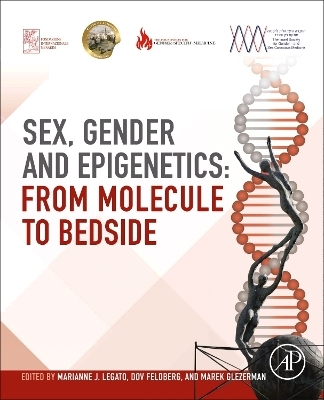
Sex, Gender, and Epigenetics
Academic Press Inc (Verlag)
978-0-12-823937-7 (ISBN)
Dr. Marianne Legato, Emerita Professor of Clinical Medicine at Columbia University, is an internationally known academic physician, author, lecturer, and specialist in gender-specific medicine. She is founding member of the International Society for Gender Medicine and the founder and director of The Partnership for Gender-Specific Medicine at Columbia University and its next iteration, The Foundation for Gender-Specific Medicine. She has published extensively on gender and sex specific medicine, both for the scientific community and for the lay public. She is also the founding editor of the Journal Gender Medicine, and the journal Gender and the Genome. In 1992, Dr. Legato won the American Heart Association’s Blakeslee Award for the best book written for the lay public on cardiovascular disease. The third edition of her textbook, Principles of Gender-Specific Medicine and her most recent book, The Plasticity of Sex., both won Prose awards from the American Association of Editors in 2021 and 2022 respectively. She is a practicing internist in New York City and has been listed each year in New York Magazine and Castle Connolly’s lists "Best Doctors" since their inception in 1993. Dr. Dov Feldberg, MD is a very active clinically and academically Ob/Gyn specialist mainly in the field of reproductive medicine for 37 years. He obtained his expertise in Reproductive Medicine at the Yale and Cornell Hospitals and Universities in USA and became one of the pioneers in the field of ART in Israel. He was an Acting Chairman and Vice Chairman of the Ob/Gyn Division at the Rabin Medical Center in Israel. For many years he was the secretary and treasurer of the The Israel Society for Gender-and Sex Conscious Medicine (IsraGem) and the treasurer of the International Society of Gender Medicine (IGM). He is the president of the Israeli Society of Psychosomatics in Ob/Gyn. He published about 130 scientific articles in the field of Reproductive Medicine and many chapters in books. He organizes national and international meetings in the field of his interest and activities. Dr. Marek Glezerman, MD has chaired for 25 years in succession three large departments of Obstetrics and Gynecology at major health care centers in Israel. He has also acted for 14 years as chairman of the National Steering Committee of ObGyn at the Maccabi Health Care Services in Israel. Since 20108, he has been deeply involved in research and promotion of Gender and Sex Conscious Medicine and is regarded as one of its pioneers on a national and international level. Prof. Glezerman is founding president of the Israel Society for Gender- and Sex-Conscious Medicine and past-president of the International Society for Gender Medicine. He is currently Head of Gender- and Sex-Conscious Medicine at Tel Aviv University. He has written/edited 6 books and published more than 340 scientific articles in professional journals and chapters in textbooks.
1. Exploring how we become what we are
2. A critical view of the revolution of precision medicine. Genetics, epigenetics, sex, and gender
3. Genetic and epigenetic contributions to female-biased lupus disease: X-chromosome inactivation in immune cells
4. Genetic, molecular, and cellular determinations of sex-specific cardiovascular traits
5. Epigenetics and mental and physical health of children born after ART
6. Epigenetic aspects of male infertility treatment
7. Evidence for assisted reproductive technology associated epigenetic variation in humans
8. Deconvoluting the functional role of DNA methylation in trauma; Implications for epigenetic therapy and prospects of targeted “epigenetic therapy
9. Antenatal Origins of Health and Disease—A clinician’s perspective
10. Maternal anxiety during pregnancy and the lack of fetal DNA methylation in cord blood
11. DNA methylation and other epigenetic modifications mediating the transgenerational impacts of paternal exposures on offspring phenotypes
12. Epigenetics and psychiatry
13. Integrative transcriptomics reveals sexually dimorphic control of the cholinergic/neurokine interface in schizophrenia and bipolar disorder
14. Gender specific neurobehavioral and gene expression changes in a valproic acid (VPA)–induced mouse model of autistic like behavior and correction by S-adenosylmethionine (SAMe)
15. Genetics and epigenetics of the onecarbon metabolism pathway in autism spectrum disorder: Role of a sex-specific brain epigenome
16. Novel mechanisms for gene regulation: Chemical tags on RNA molecules
17. Genes, environments, and epigenetics
18. Epigenetic mechanisms linking poor maternal nutrition during pregnancy to the cardio-metabolic health of offspring
19. Epigenetic aspects of human reproduction and early pregnancy
20. Sex-specific impact of maternal metabolic environment on the development of the offspring, from gametogenesis to infancy and beyond
21. Mitochondria as epigenetic regulators of reproductive aging
22. The fetal programming of telomere biology hypothesis
23. Brain organoids modeling of genetic and environmental impact on neurodevelopmental traits
| Erscheinungsdatum | 10.07.2023 |
|---|---|
| Zusatzinfo | 70 illustrations (30 in full color); Illustrations |
| Verlagsort | San Diego |
| Sprache | englisch |
| Maße | 191 x 235 mm |
| Gewicht | 450 g |
| Themenwelt | Informatik ► Weitere Themen ► Bioinformatik |
| Studium ► 2. Studienabschnitt (Klinik) ► Humangenetik | |
| Naturwissenschaften ► Biologie ► Genetik / Molekularbiologie | |
| ISBN-10 | 0-12-823937-9 / 0128239379 |
| ISBN-13 | 978-0-12-823937-7 / 9780128239377 |
| Zustand | Neuware |
| Informationen gemäß Produktsicherheitsverordnung (GPSR) | |
| Haben Sie eine Frage zum Produkt? |
aus dem Bereich


